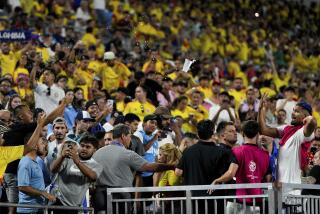Discordant note pervades World Cup
- Share via
JOHANNESBURG, South Africa — There is an undertone of disquiet about the 2010 World Cup. It is difficult to pin down exactly, but the feeling is pervasive and clues to its identity seem to surface daily.
It would be too much to blame it on the country’s sad and complicated history, but the legacy of apartheid did come into play Wednesday.
Readers in Johannesburg awoke to see the headline “History is on Bafana’s side” emblazoned across the front-page of the Star.
The reference was to host South Africa’s game against Uruguay on Wednesday, and also to June 16, 1976, when thousands of schoolchildren in Soweto staged a protest march. The protest escalated over the following weeks and, in the resulting and inevitable police crackdown, roughly 700 people died, including children.
“Tomorrow is important, especially for youth,” South Africa’s captain, Aaron Mokoena, said Tuesday. “It is a really special day for everyone and it would be great to win on the day. It is a day South Africa always remembers. The 16th means a lot.”
Sadly, playing on the 34th anniversary of the nation-altering youth march, South Africa was beaten, 3-0, by Uruguay, and its chances of advancing to the next round were severely diminished.
There was also misery Wednesday afternoon for European champion Spain, the tournament favorite. It crashed to a 1-0 defeat to upstart Switzerland. The implications are far-reaching.
No team in the 80-year history of the tournament has lost its first game and gone on to win the World Cup. If that holds true again, the talent-loaded Spanish might as well pack their vuvuzelas and head home now.
But it is not only on the playing fields of South Africa that the feelings of unease and uncertainty can be found.
In and around the stadiums, there is labor unrest among the World Cup workers, and police have taken over security at half the venues. As always, some of it involves money. The workers claim they are being paid a fraction of what they were promised.
Part of it is also unhappiness over the huge amounts spent to stage the World Cup. Trevor Ngwane, a protest organizer in Durban, explained.
“Our protest is not aimed at disrupting the World Cup,” he said. “It’s just to remind the government they must get their priorities right. When we ask for jobs, better education and houses, they tell us there is no money. But suddenly there are a billion rand to build stadiums.”
The tournament might bring in half a million or so tourists and their dollars, but the belief is that such money will never trickle down very far. “The World Cup is just for the elite,” said one community worker.
Hence the discord.
Matters have not been helped by the robberies and other criminal acts that are an almost daily occurrence in and around South African cities. It breeds mistrust and fear.
South Africa has done what it can to limit the negativity. On Wednesday, for instance, it deported 17 Argentine troublemakers who had been staying in what was labeled the “hooligan hotel.”
It was not enough, however, to silence Argentina Coach Diego Maradona, who added his voice to the list of the aggrieved by blasting two of the sport’s most iconic figures.
At a news conference before Thursday’s match against South Korea, Maradona fired the latest shot in his decades-long feud with Pele by telling the 69-year-old Brazilian legend to “go back to the museum.”
Pele apparently had been quoted as saying the only reason Maradona was Argentina’s coach was because he was out of money and out of work.
Maradona also had a few words for Michel Platini, the former French star and coach and now the president of UEFA, European soccer’s governing body. Platini had wondered aloud about Maradona’s coaching credentials.
“We all know how the French are, and Platini is French, and he believes he is better than the rest,” Maradona snapped, adding that he wanted Pele and Platini “to stop talking rubbish about me.”
Traffic jams that tie up fans for hours, the incessant backdrop drone of the vuvuzelas, the abomination of a ball that has a mind of its own, frigid winter weather, ticketing fiascos and an alarming decrease in the number of goals — 1.56 per game one-quarter of the way through the tournament — all add up to a less than a celebratory start for 2010.
Even the players realize it.
“To be honest, all the games I’ve watched haven’t been exciting,” said England striker Wayne Rooney.
But, as South Africans well know, things do get better.






